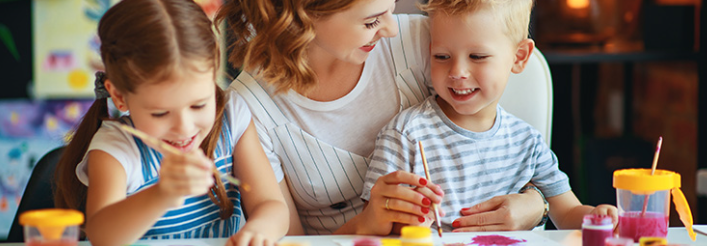Parent Partnerships

Helping your young perfectionist
by Dr Kaylene Henderson
There’s a perception in our society that perfectionism is a good thing, akin to ‘being perfect.’ That it’s something we should strive for or drop into conversation in job interviews… Yet the reality is quite different.
Perfectionism leads us to place unreasonably and often unrealistically high expectations on ourselves. Essentially, it causes us to raise the bar so high, that we frequently wind up feeling like failures, consumed by frustration and self-blame.
Of course, this can be very unsettling to witness in our kids and it can be hard for us to know how best to help. It can start when our children are very young and grow with them in intensity and impact. Perhaps you have a young child who refuses to draw because her drawings don’t look exactly like those of an adult artist. Or maybe your little guy becomes so distressed by a small mistake in his homework, that he insists on starting all over again in his unhealthy quest for perfection.
If you have older kids, perhaps they refuse to submit an assignment because it’s not perfect, or they won’t run the cross country because they know they won’t win.
While it’s great for our kids to hold high expectations of themselves, aiming for perfection actually sets them up to fail. Their habitual ‘all or nothing’ thinking leads to the unhelpful belief that if they don’t achieve 100%, they’ve as good as flunked. Their focus on their mistakes rather than on their successes often affects their self esteem, fuelling a vicious cycle that can lead to stress, depression and anxiety if left unchecked.
The sooner we help our kids break this unhealthy habit, the better. So let’s look at a few tips for doing just that.
Reduce your praise
There are two ways in which we tend to praise children. ‘Content praise’ often draws attention to the end product, for example, “What a fantastic drawing!”, or to a fixed quality in a child, such as “You’re so clever”. In contrast, ‘process praise’ focuses on how your child got there. When we use process praise, we draw attention to their good ideas, problem solving approaches, effort, persistence, concentration and enthusiasm.
While it’s helpful for all children to experience more process praise than content praise, this is particularly true for children with perfectionistic traits. This allows us to draw the focus away from how impressive the end result might (or should) be and instead highlight the importance of having a go, trying their best and learning along the way.
For example, rather than saying, ‘What a fantastic drawing! You’re an amazing artist – what were you worried about?’, it’s more helpful to say something like, ‘It’s great to see you having a go at drawing. I love watching you try new things’; or, ‘I love seeing the ideas you come up with when you draw’.
Of course, most of the time we needn’t praise children at all. Saying simply, ‘Drawing is fun isn’t it?,’ is often enough to provide children with that all important sense of connection.
Model making mistakes
At my children’s school, they’re taught to embrace ‘flearning’ – learning through failure. Admittedly, my children witness me ‘flearning’ all the time at home, but in the eyes of your child, you might seem perfect. It’s helpful for your kids to see that you make mistakes too, and importantly to learn through your modelling how mistakes can be managed.
Look for (or create!) opportunities to do this. When you’re planning on bringing some spoons to the dining table, you could bring knives over instead and say, ‘Oops, my mistake. Not to worry. I’ll just go back and swap these over.’ Or, perhaps you could draw alongside your toddler and deliberately keep from drawing inside the lines, commenting to your little one as you go, ‘I love drawing with you’. By doing so, you model for your child that mistakes are okay, that they needn’t hamper their enjoyment of a task and importantly, that the end result isn’t all that matters.
Teach your child to speak to themselves as a friend
How does your child talk to themselves?
Would they speak to a friend in the same way?
No? Then what might they say instead?
We all know how much our inner voice can affect how we feel. Teach your child to be kind to themselves. To be supportive, forgiving and encouraging, even when they make mistakes.
Consider how you react when your child behaves in an ‘imperfect’ way
Do you respond calmly when your child accidentally spills cereal all over the kitchen bench or do you tend to overreact? It’s important when we’re teaching our children that they needn’t be perfect, that our responses back this up.
By accepting our children as they are – wonderful, ‘good enough’ young learners – we teach them to do the same. And that’s so much better than perfect.


